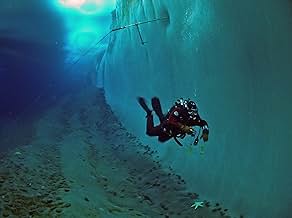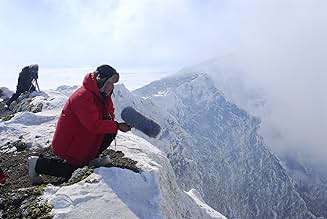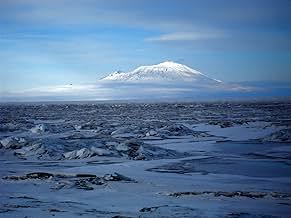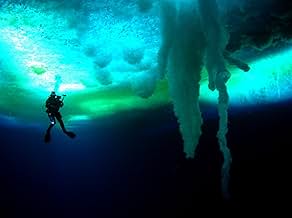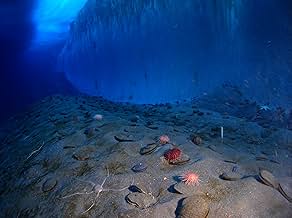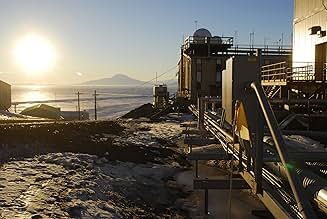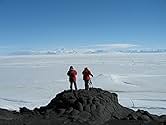Adicionar um enredo no seu idiomaFilm-maker Werner Herzog travels to the McMurdo Station in Antarctica, looking to capture the continent's beauty and investigate the characters living there.Film-maker Werner Herzog travels to the McMurdo Station in Antarctica, looking to capture the continent's beauty and investigate the characters living there.Film-maker Werner Herzog travels to the McMurdo Station in Antarctica, looking to capture the continent's beauty and investigate the characters living there.
- Indicado a 1 Oscar
- 2 vitórias e 16 indicações no total
- Self - Glaciologist
- (as Douglas MacAyeal)
- Self - Filmmaker, Cook
- (as Ryan A. Evans)
Avaliações em destaque
But, the film STILL is mesmerizing. You learn about the very unearthly sort of sounds the seals make under the ice, the sad story of a mixed-up penguin, some amazing volcano research and lots of odd facts about this MOSTLY desolate continent. Well worth seeing--just don't be too turned off by the occasionally bizarre dialog.
It focuses predominantly on the odd collection of people drawn to live in an Antarctic research station, and to a slightly lesser degree on the oddness of the region itself, and the bizarre bits of scientific trivia that can be found there. Then there the bonus meanderings about the ultimate doom of humanity and whether we originally emerged from the sea onto land to escape the "horror" of marine ecosystems.
Many of its parts are fascinating, but for me, it didn't quite come together as a whole. It drifted in a lot of different directions, but seemed overall to be lacking in focus a bit. There were also a couple of elements that disturbed me a little - one was the inconsistency of talking about how humanity is destroying itself one moment, and then bashing "tree huggers and whale huggers" the next. I guess it's OK to notice that we're damaging the world, but not to try and do something about it? The other was that in some cases he seemed to be going out of his way to depict the people he interviewed in embarrassing ways, with things like leaving the camera lingering on them after the interview appeared to be finished, as they stood nervously, apparently trying to figure out if it was over or not.
But on the whole I would recommend it -- the flaws are offset by some impressive visuals (especially the underwater footage), dry humour, interesting ideas to ponder, and a really great soundtrack by Henry Kaiser and David Lindley, which work very well with the oddness of the content.
The film perfectly balances both gorgeous footage of the continent as well as fascinating interviews and anecdotes of the many researchers and workers of the McMurdo research station. There are many humorous moments, such as a scene in which visitors must go through a follow-the-leader type exercise before being allowed to venture out into the wild. Participants in the exercise must wear buckets adorned with ridiculous caricatures over their heads in order to simulate a whiteout. They must then try to follow each other as a group and find a researcher a distance away. Herzog simply observes as the participants fail over and over to find the researcher, which left the audience laughing for minutes on end. Another excellent scene has Herzog interviewing an expert on penguins, who goes into some of their more bizarre behavior, such when penguins go insane. In both cases, Herzog features striking footage and amusing interviews and narration.
The film fits in well with Herzog's already substantial canon. It is a beautiful look at a beautiful continent populated by a forklift driver with a PhD, a woman who once traveled to South America in a sewage pipe on the back of a truck, researchers who play electric guitars on top of research station to celebrate discovering three new species of aquatic life in one day, and many more. Their stories converge where all the lines on the map meet at the end of the world. Herzog shot the film with a crew of just himself and the camera operator, and the result is a film with some of the most beautiful footage I've ever seen. Do not miss this when it receives general release!
Interestingly, it seems that this is less by design than by accidents that occur because he chooses to put his camera in places where the cosmos is unstable. Sometimes it rewards deeply, because we find our own window into beautiful chaos. Sometimes the experiments fail, and you can see how he has tried to distract us with observations from himself rather than the world he has placed us in.
This is such a failure. He goes, enticed by the promise of cruel, unfathomable beauty. He finds no accident with inherent narrative, so he inserts his own. Unfortunately, Herzog the man and mind is the least interesting element of any Herzog film. I know I am in the minority here, because he has a celebrity persona.
But watch this, and see how he interviews his subjects. He is trying to cast them as beautiful souls doomed be a part of the ugliness of humanity. Some of the interviews are staged or rehearsed. He admits this. I know the words are genuinely from the people who speak them, but the narrative is false. Herzog has this notion — this essentially Austrian notion — that nature is only full when it is cruel, stark and dangerous. Humanity is unnatural; only a few butterfly souls escape, and they are to be cherished.
So look here: we have his usual Wagnerian chorus, using internationally fused sounds. We have some nature, always presented as cosmically unfriendly. We have episodes that underscore the hopeless weakness of society. And we have characters that engage and inspire. But it all seems so desperately constructed here. Whether he likes it or not, he has simply made a penguin film, but with humans.
Ted's Evaluation -- 2 of 3: Has some interesting elements.
Você sabia?
- CuriosidadesWerner Herzog dedicated the film to Roger Ebert, who he calls a true "warrior of cinema". Due to the dedication Ebert could not review the film, but he wrote a complimentary letter to Herzog and later published it.
- Citações
[last lines]
Stefan Pashov: There is a beautiful saying by an American philosopher, Alan Watts. He used to say that through our eyes the universe is perceiving itself, and through our ears the universe is listening to its cosmic harmonies. And we are the witness to which the universe becomes conscious of its glory, of its magnificence.
- ConexõesEdited from O Mundo em Perigo (1954)
- Trilhas sonorasPlanino Stara Planino Mari
Written by Stefan Dragostinov
Performed by The Philip Koutev National Folk Ensemble
Principais escolhas
- How long is Encounters at the End of the World?Fornecido pela Alexa
Detalhes
- Data de lançamento
- País de origem
- Central de atendimento oficial
- Idiomas
- Também conhecido como
- Encounters at the End of the World
- Locações de filme
- Empresas de produção
- Consulte mais créditos da empresa na IMDbPro
Bilheteria
- Faturamento bruto nos EUA e Canadá
- US$ 944.933
- Fim de semana de estreia nos EUA e Canadá
- US$ 17.730
- 15 de jun. de 2008
- Faturamento bruto mundial
- US$ 1.205.464
- Tempo de duração
- 1 h 39 min(99 min)
- Cor
- Mixagem de som
- Proporção
- 1.78 : 1







